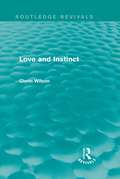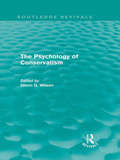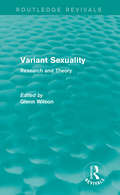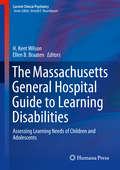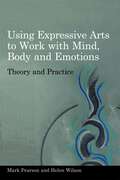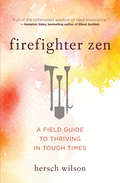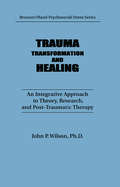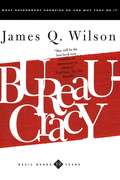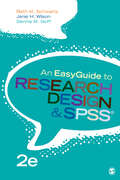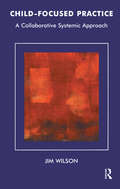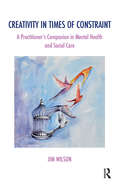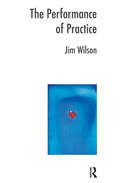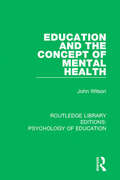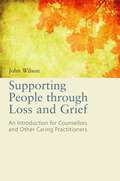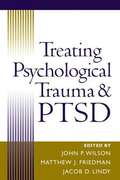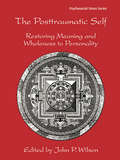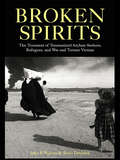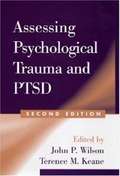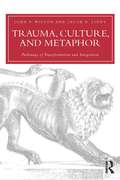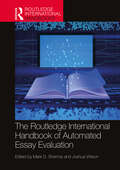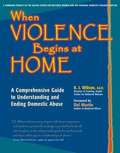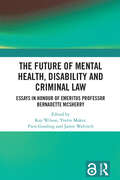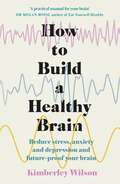- Table View
- List View
Love and Instinct (Routledge Revivals)
by Glenn WilsonFirst published in 1981, this title takes a ‘sociobiological’ approach to the exploration of sexual habits, looking at the fundamental biological nature of humans. The book covers the spectrum of human sexuality, considering love and marriage, variant sexuality and social influences. This is a valuable reissue for any student of sexual psychology or cultural and evolutionary anthropology with an interest in the fundamental influences on human sexuality.
The Psychology of Conservatism (Routledge Revivals)
by Glenn WilsonFirst published in 1973, The Psychology of Conservatism explores attitudes, their measurement, their structure and dynamics, and the personality traits apparently underlying attitude patterns. It examines the link between differing attitudes and discusses characteristic patterns and syndromes. The book focuses on the origins and dynamics of a major factor called "liberalism – conservatism" which is found to account for much of the variance in attitudes amongst different people. Contributors review previous studies relating to personality and attitude before engaging in new studies and proposing their own theories to explain the conservative attitude. The book introduces provocative theoretical ideas and provides a valuable examination of an important psychological and social attitude syndrome. This book will be of interest to researchers in personality and social psychology, sociology and political science and education.
Variant Sexuality: Research and Theory (Routledge Revivals)
by Glenn WilsonFirst published in 1987, this book presents contributions from international authorities reviewing major themes in variant sexuality. Genetic and evolutionary arguments are presented for the preponderance of paraphilia in males, whilst Freudian and psychoanalytic theories are shown to have limited scientific basis. These and other topics are reviewed in an interesting book, which will be of particular value to students of the psychology of sexuality, evolutionary biology and psychiatry, as well as those with a more general interest in the social, behavioural and biological aspects of sexuality.
The Massachusetts General Hospital Guide to Learning Disabilities: Assessing Learning Needs Of Children And Adolescents (Current Clinical Psychiatry)
by H. Kent Wilson Ellen B. BraatenThis book connects experts in the field of child assessment to provide child psychiatrists with knowledge in evaluation and educational programming. The book provides a review of the latest science behind: common learning disabilities, including etiology and guidelines for assessment/diagnosis; neurodevelopmental disorders, like learning disabilities, ADHD; psychiatric disorders in childhood such as mood and anxiety disorders; and impact learning and development protocols. The Massachusetts General Hospital Guide to Learning Disabilities evaluates the interventions that are effective in addressing these learning challenges in the context of multiple factors in a way that no other current text does. Special topics such as special education law and managing the needs of transitional age youth allow psychiatrists to support their patients’ and their families as they navigate the system. By offering a better understanding the learning needs of their patients, this texts gives readers the tools to consult with families and educators regarding how to address the learning needs of their patients at school and in other settings. <p><p> \The Massachusetts General Hospital Guide to Learning Disabilities is a vital took for child psychiatrists, students, assessment professionals, and other professionals studying or working with children suffering from learning disabilities.
Using Expressive Arts to Work with Mind, Body and Emotions
by Helen Wilson Mark PearsonUsing Expressive Arts to Work with Mind, Body and Emotions combines theory, research and activities to produce practical suggestions for enhancing client participation in the therapy process. It surveys the literature on art therapy; somatic approaches; emotion-activating models; use of music, writing and dreamwork; and the implications of the new findings in neuroscience. The book includes step-by-step instructions for implementing expressive therapies techniques, and contains a wide range of experiential activities that integrate playful yet powerful tools that work in harmony with the client's innate ability for self-healing. The authors discuss transpersonal influences along with the practical implications of both emotion-focused and attachment theories. Using Expressive Arts to Work with Mind, Body and Emotions is an essential guide to integrating creative arts-based activities into counselling and psychotherapy and will be a useful manual for practitioners, academics and student counsellors, psychologists, psychotherapists, social workers and creative arts therapists.
Firefighter Zen: A Field Guide to Thriving in Tough Times
by Hersch Wilson&“Be brave. Be kind. Fight fires.&” That&’s the motto of firefighters, like Hersch Wilson, who spend their lives walking toward, rather than away from, danger and suffering. As in Zen practice, firefighters are trained to be fully in the moment and present to each heartbeat, each life at hand. In this unique collection of true stories and practical wisdom, Wilson shares the Zen-like techniques that allow people like him to stay grounded while navigating danger, comforting others, and coping with their personal response to each crisis. Every life contains the unexpected and the unwelcome. How you cope with those inevitable events, more than the events themselves, defines the quality of your life. Firefighter Zen is an invaluable guide to meeting every day with your best calm, resilient, and optimistic self.
Trauma, Transformation, And Healing.: An Integrated Approach To Theory Research & Post Traumatic Therapy (Psychosocial Stress Series)
by J. P. WilsonFirst published in 1989. This rich and exciting book draws together a wide range of theoretical conceptualizations, current research, and clinical understanding to provides up-to-date and comprehensive account yet available of traumatic stress and its consequences. John Wilson integrates complex theoretical frameworks from Freud to Seligman, Horowitz to Selye, to paint a powerful explanatory picture of the interaction between trauma, person, and post-trauma environment.
Bureaucracy: What Government Agencies Do And Why They Do It
by James Q. WilsonThe classic book on the way American government agencies work and how they can be made to work better -- the "masterwork" of political scientist James Q. Wilson (The Economist)In Bureaucracy, the distinguished scholar James Q. Wilson examines a wide range of bureaucracies, including the US Army, the FBI, the CIA, the FCC, and the Social Security Administration, providing the first comprehensive, in-depth analysis of what government agencies do, why they operate the way they do, and how they might become more responsible and effective. It is the essential guide to understanding how American government works.
An EasyGuide to Research Design & SPSS (EasyGuide Series)
by Janie H. Wilson Beth M. Schwartz Dennis M. GoffAn EasyGuide to Research Design and SPSS® is an essential resource for students to successfully navigate and complete research projects. Using a clear, concise, and conversational writing style, authors Beth M. Schwartz, Janie H. Wilson, and Dennis M. Goff cover all of the most basic and common designs and analyses that students need to know for appropriately testing a hypothesis. The handbook includes step-by-step instructions accompanied by ample screenshots for working with data in SPSS®, along with guidance on interpreting outputs and formatting results in APA style. The Second Edition features a streamlined organization, updated references, and new content on factorial designs, effect size, and G*Power.
An EasyGuide to Research Design & SPSS (EasyGuide Series)
by Janie H. Wilson Beth M. Schwartz Dennis M. GoffAn EasyGuide to Research Design and SPSS® is an essential resource for students to successfully navigate and complete research projects. Using a clear, concise, and conversational writing style, authors Beth M. Schwartz, Janie H. Wilson, and Dennis M. Goff cover all of the most basic and common designs and analyses that students need to know for appropriately testing a hypothesis. The handbook includes step-by-step instructions accompanied by ample screenshots for working with data in SPSS®, along with guidance on interpreting outputs and formatting results in APA style. The Second Edition features a streamlined organization, updated references, and new content on factorial designs, effect size, and G*Power.
Child-Focused Practice: A Collaborative Systemic Approach (The Systemic Thinking and Practice Series)
by Jim WilsonThe author, with over twenty years of experience of working with children, writes refreshingly about the practical aspects of his work. He takes traditional and contemporary theories and explains them in the context of how he works with children.
Creativity in Times of Constraint: A Practitioner's Companion in Mental Health and Social Care (The Systemic Thinking and Practice Series)
by Jim WilsonContemporary practices in mental health (and social care) are increasingly characterized by approaches that overly simplify social, political, and psychological concerns. The persistence and ubiquity of models designated to tackle diagnoses through focused technologies serve to minimize the human encounter in all its relational and systemic complexity. Practice becomes a technological activity instead of one concerned with the unique creative potential in meeting with others in therapy. With the growth of privatized mental health services, many practitioners are facing a plethora of "Must Do's" that focus on measurable outcomes, with clear goals and cost effective treatments. Yet, in practice, such apparent clarity of purpose often leads to bureaucratic clutter and risk aversion instead of clearing the decks for creativity. The focus of this book is how the practitioner or therapist can navigate around current practices in order to avoid falling into the rapids of quick fix solutions, whilst staying afloat to find realistic outcomes to human dilemmas that are brought to us.
The Performance of Practice: Enhancing the Repertoire of Therapy with Children and Families (The Systemic Thinking and Practice Series)
by Jim WilsonThis book is about how to maintain an aliveness to the possibilities in therapy and practice and how to challenge ideas of orthodoxy in theory and methodologies that can become stale or followed like religions.
Education and the Concept of Mental Health (Routledge Library Editions: Psychology of Education)
by John WilsonThe concept of ‘normality’ or mental health is a difficult one to define, but educators and social psychologists must have a clear definition of it in order to proceed with practical work. In this stimulating and informative book, originally published in 1968, Mr Wilson discusses the idea of mental health, both as a general concept and specifically as it affects the teacher as educator. He deals with the problems of learning and the ‘difficult’ child, not confining his suggestions within the boundaries of curricular teaching but exploring the wider aspect of moral education.
Supporting People through Loss and Grief: An Introduction for Counsellors and Other Caring Practitioners
by John WilsonWhat are the different theories of grief? What skills do you need for effective counselling? How can you support people experiencing loss and grief? This handbook provides a comprehensive guide to counselling and supporting people experiencing loss and grief. It introduces the different models and theories of grief, how theory relates to practice and what the essential skills are, and how to work with people in practice. Working with families, understanding diversity and assessing clients are all covered, as well as a chapter on personal and professional development. Case studies and real life examples demonstrate skills in action, and each chapter concludes with notes for trainers. This essential guide will help all those working with people suffering loss and grief to understand grief and how to help. Counsellors, bereavement support volunteers, palliative care nurses, hospice volunteers and students in these fields will all find this an invaluable resource. It can be used as a training guide as well as a resource for individuals, both as a learning tool and for continuing professional development.
Treating Psychological Trauma and PTSD
by John WilsonMuch has been learned about PTSD in the past two decades, yet many questions remain about the complex pathways by which trauma disrupts people's lives. This authoritative volume presents an innovative psychobiological framework to help clinicians and researchers better understand the myriad difficulties facing patients and navigate the array of available intervention approaches. Incorporating the latest theory and clinical research, the book provides a crucial reformulation of diagnostic criteria and treatment goals. It then brings together leading treatment experts to describe and illustrate their respective approaches, facilitating the selection and implementation of the most effective interventions for individual patients. The book first delineates a holistic, organismic model of PTSD. Particular attention is given to how the concept of allostatic load has enabled contemporary investigators to gain a more dynamic view of human stress responses and how they may go awry. Aided by clearly presented tables and charts, the volume elucidates the process by which traumatic experiences can give rise to 65 symptoms contained within five symptom clusters. Augmenting the traditional domains of PTSD symptomatology physiological disturbances, traumatic memory, and avoidance are two additional clusters dealing with frequently encountered problems with self and identity and with attachment, intimacy, and personal relationships. Contributors then provide detailed presentations of core therapeutic approaches acute posttraumatic interventions, cognitive-behavioral approaches, pharmacotherapy, group psychotherapy, and psychodynamic techniques, as well as approaches for special populations. The concluding section reviews and synthesizes all case material presented, examining which symptoms are addressed by each modality, which treatment objectives are met, and which clients are likely to be helped.
The Posttraumatic Self: Restoring Meaning and Wholeness to Personality (Psychosocial Stress Series)
by John P. WilsonFilling a gap that exists in most traumatology literature, The Posttraumatic Self provides an optimistic analysis of the aftermath of a traumatic event. This work appreciates the potentially positive effects of trauma and links those effects to the discovery of one's identity, character, and purpose. Wilson and his distinguished contributors explore the nature and dynamics of the posttraumatic self, emphasising human resilience and prompting continued optimal functioning. While taking into consideration pathological consquences such as posttraumatic stress disorder (PTSD), the authors study the impacts a traumatic event can have on one's inner self, and they help the victims transform such an event into healthy self-transcendent lifecycles. The Posttraumatic Self will help victims and healers transform the way they deal with the complexities of trauma by making important connections that will allow for healing and growth.
Broken Spirits: The Treatment of Traumatized Asylum Seekers, Refugees and War and Torture Victims
by John P. Wilson Boris DrozdekMental health problems among asylum seekers and refugees are becoming a public issue, but awareness of this problem among the mental health community is relatively low. Although advances have been made in the provision of innovative mental health services for asylum seekers and refuges with PTSD, they are not systemized, and not widely known to professionals in the field. A publication offering practical guidelines for the treatment of torture victims and political refugees does not exist. Broken Spirits aims to bring together the works of the most respected mental health professionals - from the U.S. and abroad - and make available the most current knowledge on complex PTSD, forced migration and cultural sensitivity in diagnosis and treatment.
Assessing Psychological Trauma and PTSD
by John P. Wilson Terence M. KeaneFrom prominent authorities in the field, the revised and expanded second edition of this acclaimed work is an essential resource for anyone providing treatment services or conducting research in the area of trauma and PTSD. The volume reviews the breadth of current knowledge about trauma assessment and provides clear, up-to-date recommendations for practice. Coverage encompasses the uses of standardized measures, clinical procedures, epidemiological methods, and projective techniques, as well as approaches to evaluating specific survivor populations. Existing chapters have been fully rewritten and seven entirely new chapters added, addressing recent developments in classification; emerging applications of neuroimaging and pharmacological probes; legal and forensic issues in assessment; assessment of comorbid PTSD and substance abuse; and effects of trauma on physical health.
Trauma, Culture, and Metaphor: Pathways of Transformation and Integration (Psychosocial Stress Series)
by John P. Wilson Jacob D. LindyIn Trauma, Culture, and Metaphor, John Wilson and Jacob Lindy explore the language of both individual and collective trauma in an era dominated by globalization and interconnectedness. Through lucid, careful discussion, this important book builds a bridge between the etymology of trauma-related terms commonly used in Western cultures and those of other cultures, such as the Burundi-Rwandan ihahamuka. It also provides the clinician with a framework for working with trauma survivors using a cross-cultural vocabulary—one often based in metaphor—to fully address the experienced trauma and to begin work on reconnection and self-reinvention.
The Routledge International Handbook of Automated Essay Evaluation (Routledge International Handbooks)
by Joshua Wilson Mark D. ShermisThe Routledge International Handbook of Automated Essay Evaluation (AEE) is a definitive guide at the intersection of automation, artificial intelligence, and education. This volume encapsulates the ongoing advancement of AEE, reflecting its application in both large-scale and classroom-based assessments to support teaching and learning endeavors.It presents a comprehensive overview of AEE's current applications, including its extension into reading, speech, mathematics, and writing research; modern automated feedback systems; critical issues in automated evaluation such as psychometrics, fairness, bias, transparency, and validity; and the technological innovations that fuel current and future developments in this field. As AEE approaches a tipping point of global implementation, this Handbook stands as an essential resource, advocating for the conscientious adoption of AEE tools to enhance educational practices ethically. The Handbook will benefit readers by equipping them with the knowledge to thoughtfully integrate AEE, thereby enriching educational assessment, teaching, and learning worldwide.Aimed at researchers, educators, AEE developers, and policymakers, the Handbook is poised not only to chart the current landscape but also to stimulate scholarly discourse, define and inform best practices, and propel and guide future innovations.
When Violence Begins at Home: A Comprehensive Guide to Understanding and Ending Domestic Abuse
by K. J. WilsonSince its initial publication, this far-reaching reference has provided professionals and victims of abuse with guidance on everything from indicators of an abusive relationship to domestic violence legislation, from antiburnout tips for helpers to advice on leaving an abusive partner. This updated edition addresses new research and programs, adding information on date rape drugs, stalking, cyber-stalking, pregnancy and domestic violence, and the effectiveness of batterer intervention programs. Current controversial social and legal issues such as mutual battering, child welfare and "failure to protect" policies, child custody and visitation rights for batterers, mandatory arrests, and welfare reform are also covered. Two new chapters devote attention to domestic violence in the military and to the challenging and rewarding role of those who work with battered women and their children. New resources have been included to reflect the ever-evolving wealth of books, web sites, and agencies available to both helpers and those in need.
The Future of Mental Health, Disability and Criminal Law
by Kay Wilson Yvette Maker Piers Gooding Jamie WalvischThis book brings together contributions from twenty-three world-leading scholars and commentators that address a range of contemporary and pressing international themes in mental health, disability and criminal law. The authors use the work of internationally renowned academic, Emeritus Professor Bernadette McSherry, as a springboard to reflect on recent developments in these areas of law and to anticipate the future directions they may take. In doing so, they aim to inform and inspire a new generation of mental health, disability and criminal law scholars, advocates and reformers. The book is divided into four substantive sections: reforming mental health and disability law; regulating coercion and restrictive practices; improving access to justice and the criminal law; and transforming mental health law. It also includes an introduction from the editors and an afterword from Emeritus Professor McSherry. The book is aimed at regulators, policymakers, lawyers, clinicians, consumer advocates and academics who are interested in the urgent and contentious issues surrounding the reform and development of mental health, disability and criminal law. It will help them understand the key issues and problems and presents suggestions for reform. The book is interdisciplinary and international in its focus.
How to Build a Healthy Brain: Reduce stress, anxiety and depression and future-proof your brain
by Kimberley Wilson'A practical manual for your brain.' - Dr Megan Rossi, author of Eat Yourself HealthyA groundbreaking science-based guide to protecting your brain health for the long term.Whatever your age, having a healthy brain is the key to a happy and fulfilled life. Yet, for both young and old, diseases of the brain and mental health are the biggest killers in the 21st century. We all know how to take care of our physical health, but we often feel powerless as to what we can do to protect our mental well-being too.How to Build a Healthy Brain is here to help. Written by a passionate advocate for the importance of mental health, Chartered Psychologist Kimberley Wilson draws on the latest research to give practical, holistic advice on how you can protect your brain health by making simple lifestyle choices. With chapters on Sleep, Nutrition, Exercise and Meditation, Kimberley has written an empowering guide to help you look after both your physical and mental well-being.'Finally, a book that puts the brain at the centre of the health conversation, where it belongs.' - Shona Vertue, author of The Vertue Method'A psychologist, she runs a successful private clinic in central London, combining therapy with nutrition advice, and has just written her first (excellent) book, How to Build a Healthy Brain, about protecting our mental wellbeing through factors such as diet, sleep and exercise.' - The Times 'I love your book ... it made me equal parts really excited and passionate, and also pretty angry. The science is there but it isn't being translated. This is a huge area that affects us all ... your book is absolutely brilliant at explaining what we can do to look after our brain health.' - Ella Mills on Deliciously Ella: The Podcast
How to Build a Healthy Brain: Reduce stress, anxiety and depression and future-proof your brain
by Kimberley Wilson'A practical manual for your brain.' - Dr Megan Rossi, author of Eat Yourself HealthyA groundbreaking science-based guide to protecting your brain health for the long term.Whatever your age, having a healthy brain is the key to a happy and fulfilled life. Yet, for both young and old, diseases of the brain and mental health are the biggest killers in the 21st century. We all know how to take care of our physical health, but we often feel powerless as to what we can do to protect our mental well-being too.How to Build a Healthy Brain is here to help. Written by a passionate advocate for the importance of mental health, Chartered Psychologist Kimberley Wilson draws on the latest research to give practical, holistic advice on how you can protect your brain health by making simple lifestyle choices. With chapters on Sleep, Nutrition, Exercise and Meditation, Kimberley has written an empowering guide to help you look after both your physical and mental well-being.'Finally, a book that puts the brain at the centre of the health conversation, where it belongs.' - Shona Vertue, author of The Vertue Method'A psychologist, she runs a successful private clinic in central London, combining therapy with nutrition advice, and has just written her first (excellent) book, How to Build a Healthy Brain, about protecting our mental wellbeing through factors such as diet, sleep and exercise.' - The Times 'I love your book ... it made me equal parts really excited and passionate, and also pretty angry. The science is there but it isn't being translated. This is a huge area that affects us all ... your book is absolutely brilliant at explaining what we can do to look after our brain health.' - Ella Mills on Deliciously Ella: The Podcast
